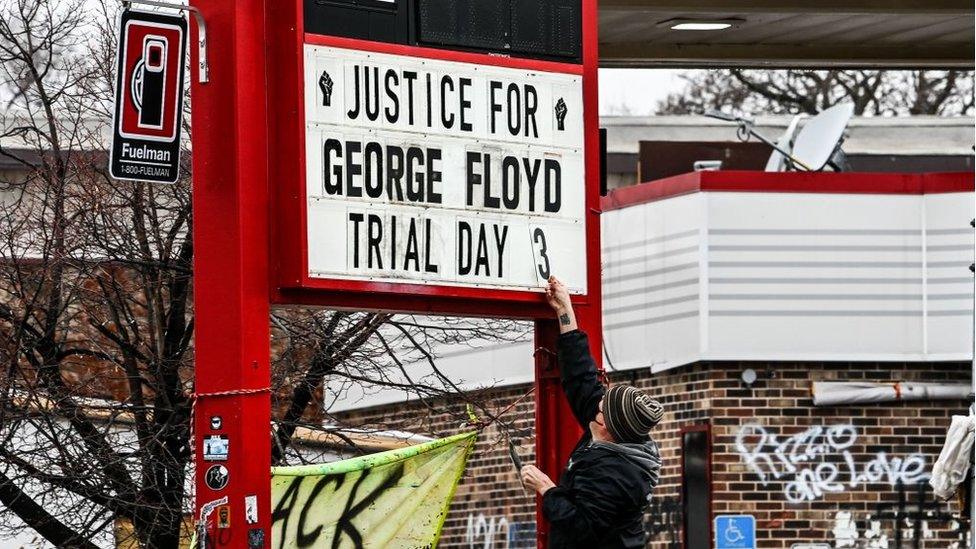George Floyd: What witnesses have said in the Chauvin trial
- Published
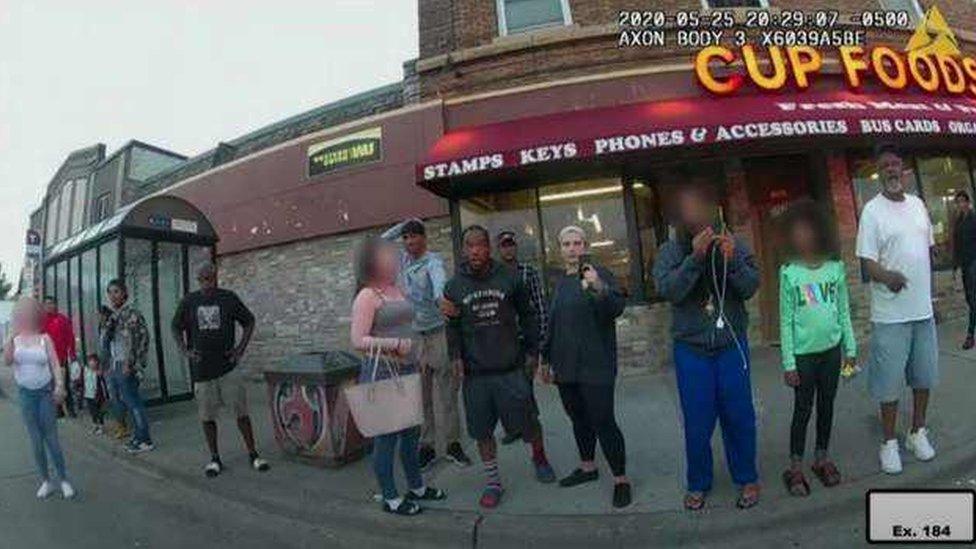
Officer Thao's police body camera showed witness bystanders
Witnesses to the arrest of George Floyd have given emotional testimony about being at the scene of Mr Floyd's arrest.
Mr Floyd's girlfriend, the teenager who filmed the viral video from the scene and a city fire-fighter who begged police to check Mr Floyd's pulse are among those who have testified they watched Mr Floyd under the knee of ex-police officer Derek Chauvin.
The former officer denies charges of murder and manslaughter, and his defence team heard from a police officer who responded to the scene of Mr Floyd's arrest, a use-of-force expert and a forensic pathologist.
Mr Chauvin has decided not to testify, invoking his Fifth Amendment right under the constitution to stay silent and avoid self-incrimination.
Here's what we've heard so far.

Courteney Ross
'I had lost a lot of faith in God when I met George'
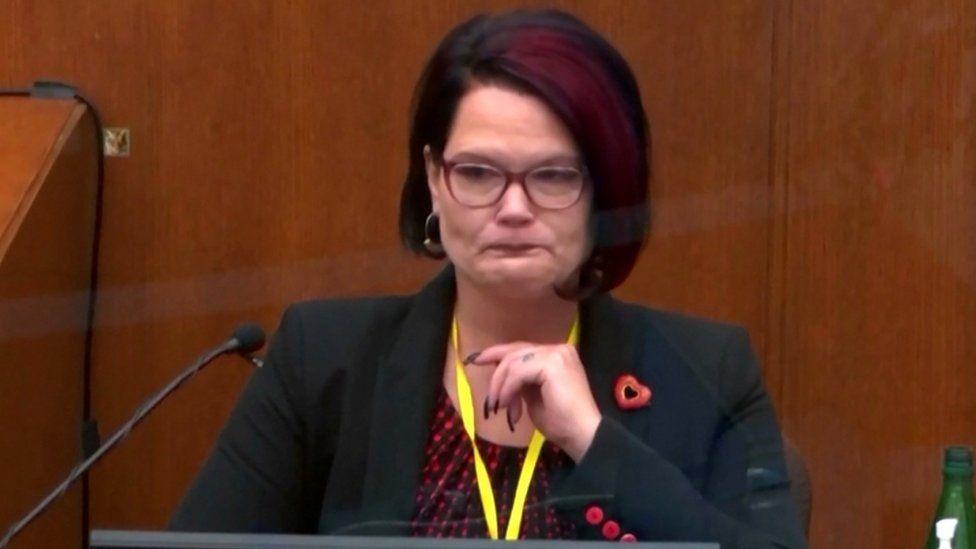
Mr Floyd's girlfriend of the last three years, Courteney Ross, provided some of the most emotional testimony of the trial. She is, to date, the only witness to take the stand who personally knew Mr Floyd.
She described their first meeting in the lobby of a Salvation Army homeless shelter, where Mr Floyd worked as a security guard.
Ms Ross was waiting to see the father of her son, and she said Mr Floyd asked her to pray with him, a memorable and "sweet" gesture at a time when she "had lost a lot of faith in God".
She said it was "one of my favourite stories to tell". The couple shared their first kiss that night, she said.
Ms Ross also told the court they both suffered from chronic pain, which led to an off and on struggle with opioid addiction.
"We got addicted and tried really hard to break that addiction many times," she testified.
She did not specifically address whether Mr Floyd was using opioids on the day he died.
Christopher Martin
'If I would have just not taken the bill, this could have been avoided'
The teenage store clerk who says he believes that Mr Floyd unknowingly paid for cigarettes with a fake $20 bill told the court he was grappling with feelings of guilt over Mr Floyd's death.
Mr Martin, 19, said he had also been living in the building above Cup Foods, but moved after the incident and stopped working at the store.
"I didn't feel safe," the teen said.
He said Mr Floyd "appeared to be high" that day because he struggled to respond to a simple question, but that he was lucid enough to hold a conversation. He described Mr Floyd as "friendly and approachable".
Mr Martin, who witnessed the arrest, said he felt "disbelief and guilt" because "if I'd have just not taken the bill, this could have been avoided".
Donald Williams
'I did call the police on the police'
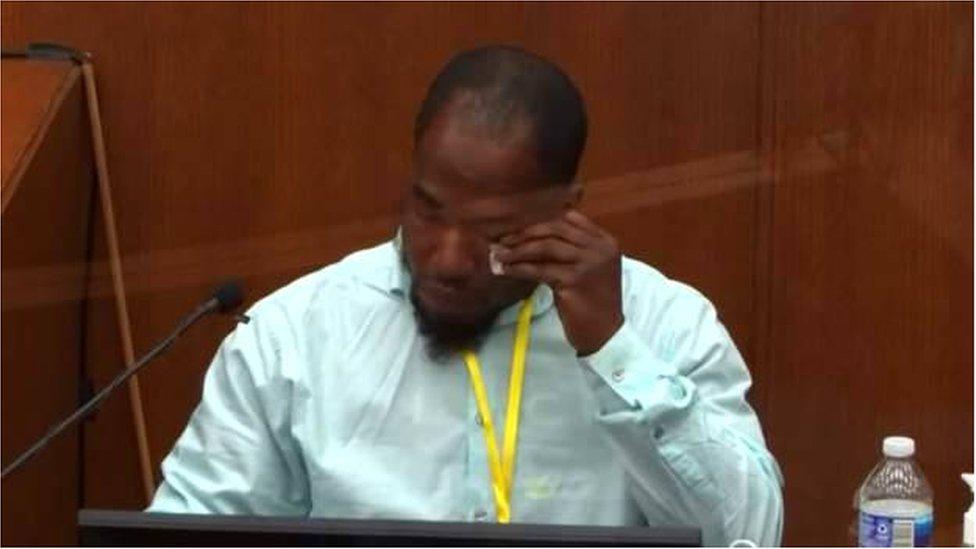
Among those to testify was a security guard and former wrestler trained in mixed martial arts who was heard in the viral video of Mr Floyd's arrest calling the officers "punks" and "murderers".
Mr Williams, 33, had gone fishing with his son earlier that day, and had gone to Cup Foods to get a drink.
"I did call the police on the police. I believe I witnessed a murder. I felt the need to call the police on the police," he testified.
"That was bogus, what they just did," he told the 911 dispatcher, according to a recording of the call played in court.
Mr Williams alleged he witnessed Mr Chauvin use a "blood choke" to cut off the airway, and a "shimmy" hold to keep up the pressure on Mr Floyd.
He said he watched Mr Floyd's life "fade away, like a fish in a bag".
Under cross-examination, he took issue with the notion that he and the crowd were growing "angrier and angrier".
He said his words "grew more and more pleading for life", as Mr Floyd fell unconscious.
When defence lawyer Eric Nelson repeated the question, Mr Williams again objected.
"I grew professional and professional," he said. "I stayed in my body. You can't paint me out to be angry."
Chief Medaria Arradondo
'It's not part of our training and it's certainly not part of our ethics or values'
The Minneapolis police chief, who oversees around 800 officers in the city, was one of the most high profile witnesses for the prosecution.
Chief Arradondo, the city's first African-American police chief, fired Mr Chauvin one day after the arrest and previously condemned his actions as "murder".
During the trial, he testified that Mr Chauvin violated police procedures.
He said that Mr Chauvin had shown some "initial reasonableness" when he used force on Mr Floyd as he resisting getting in the back of the police car.
But when Mr Floyd had stopped resisting and "clearly when Mr Floyd was no longer responsive and even motionless, to continue to apply that level of force to a person prone out, hands cuffed behind their back - that in no way, shape or form is anything that is by policy," Chief Arradondo said.
"It's not part of our training and it's certainly not part of our ethics or values."
Jena Scurry
'My instincts were telling me something is wrong'
The first witness called to testify was a 911 dispatcher who had sent police to Cup Foods, where Mr Floyd had allegedly bought cigarettes with a counterfeit bill.
Ms Scurry watched the arrest unfold on a live CCTV feed on a camera across the street from the shop, and thought that the video had "frozen" due to how long the three officers remained on top of Mr Floyd.
"They were still on the ground. That whole situation was still the same," she said, noting that she was also being distracted by other work matters at the time.
"My instincts were telling me something is wrong, something is not right. I don't know what, but something was not right," she said. "It was an extended period of time."
She called a supervisory sergeant to report what she saw. "Call me a snitch if you want to," she said according to audio of the call, adding "all of them sat on this man".
Genevieve Hansen
'We're lucky it was video-taped'
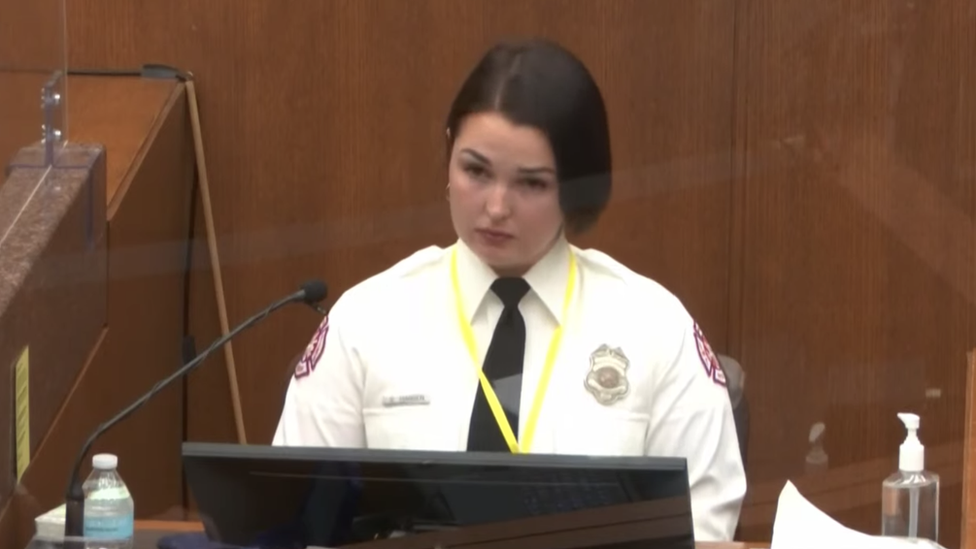
The off-duty Minneapolis city fire-fighter was hoping to have "a peaceful day" and went for a walk, she testified.
She noticed the lights of the police car, and wondered if her co-workers were responding to a fire.
"As I got closer there was a woman across the street screaming that they were killing him," said Ms Hansen, 27, who is also a trained emergency medical technician (EMT).
"I was concerned to see a handcuffed man who was not moving with officers with their whole body weight on his back and a crowd who was stressed out," she said.
Ms Hansen described pleading with the officers to check Mr Floyd's pulse and to begin CPR. One officer, she said, told her that "if you really are a Minneapolis fire-fighter you would know better than to get involved".
There were several heated moments during Ms Hansen's cross-examination by the defence.
When Mr Chauvin's attorney asked her if the crowd had been "upset or angry", she replied: "I don't know if you've seen anybody be killed, but it's upsetting."
In another testy response after she was challenged over her recollection of the incident, she said: "We're lucky it was video taped."
New bodycam footage of George Floyd's arrest
Charles McMillian
'What I watched was wrong'
The first bystander on the scene of George Floyd's arrest was 61-year-old Charles McMillian, a self-described "nosy" resident.
He pled repeatedly with Mr Floyd to "get up and get in the car" and told him "you can't win". He also said the officers looked like they were trying to "hogtie" him.
While viewing graphic footage of the arrest in court, Mr McMillian broke down in tears and was unable to continue his testimony for a while. In the video, the court heard him tell Mr Chauvin: "Your knee on his neck - that's wrong man."
He described feeling "helpless" seeing the incident unfold.
Mr McMillian said that he confronted officer Derek Chauvin after Mr Floyd was taken away in an ambulance because "what I watched was wrong".
"I think I said to him: 'Five days ago I told you at the end of the day go home to your family safe, and that the next person go home to their family safe, but today I gotta look at you as a maggot,'" he said.
Darnella
'I stay up apologising and apologising to George Floyd'
"When I look at George Floyd, I look at my dad. I look at my brothers, I look at my cousins, my uncles. Because they are all black," said the 18-year-old that filmed the viral video of the arrest.
"I look at that and I look at how that could have been one of them," said Darnella, the first of four witnesses who the judge permitted to speak off-camera because they were minors at the time of the incident.
"It's been nights I stay up apologising and apologising to George Floyd for not doing more and not physically interacting and not saving his life," she continued.
"But it's not what I should have done. It's what he should have done," she said in a reference to Mr Chauvin.
Darnella's cousin
'I was sad and kinda mad'
Darnella's nine-year-old cousin testified that Mr Chauvin did not take his knee off Mr Floyd's neck even after ambulance workers had told him to.
"I was sad and kind of mad, and it felt like it was stopping his breathing and it was hurting him," she replied when asked how the event made her feel.
"It sounded like he was hurting," she added.
Alyssa
'I was failing to do anything'
Another teenager present that day said she felt powerless to help as she saw Mr Chauvin work to maintain pressure on Mr Floyd.
"I kind of saw him move his knee down more," said the 18-year-old, "down onto Mr Floyd's neck."
"I felt like there wasn't really anything I could do," Alyssa continued. "As a bystander I was powerless there, and I was failing to do anything."
Asked why she shouted to Mr Chauvin to release Mr Floyd, she said: "I knew time was running out or it had already... That he was going to die."
Kaylynn
'I was scared of Chauvin'
"He was like digging his knee into George Floyd's neck," testified the 17-year-old.
She added that Mr Chauvin "did grab his Mace and started shaking it at us... I didn't know what was going to happen."
"I was scared of Chauvin," she added.

Barry Brodd
'Derek Chauvin was justified and acting with objective reasonableness'
The use-of-force expert, called by the Chauvin defence team, said "the imminent threat" posed by Mr Floyd was a major factor in his detention.
"I felt that Derek Chauvin was justified and acting with objective reasonableness following Minneapolis police department policy and current standards of law enforcement in his interaction with George Floyd," he said.
"From a police officer's standpoint, you don't have to wait for it to happen. You just have to have a reasonable fear that somebody is going to strike you, stab you, shoot you."
Mr Brodd added: "It's easy to sit in an office and judge an officer's conduct. It's more of a challenge to put yourself in the officer's shoes, to try to make an evaluation through what they are feeling, what they're sensing, the fear they have, and then make a determination."
Defence lawyer Eric Nelson asked Mr Brodd: "Was this a deadly use of force?"
"No, it was not," Mr Brodd replied.
Cross-examining Mr Brodd, the prosecution maintained that the dangers of positional asphyxia - not being able to breathe in a certain position - were well known.
"Would you agree that that's something commonly understood in law enforcement?" prosecutor Steve Schleicher asked.
"Yes," Mr Brodd replied, confirming it was not new information.
David Fowler
'So many conflicting different potential mechanisms'
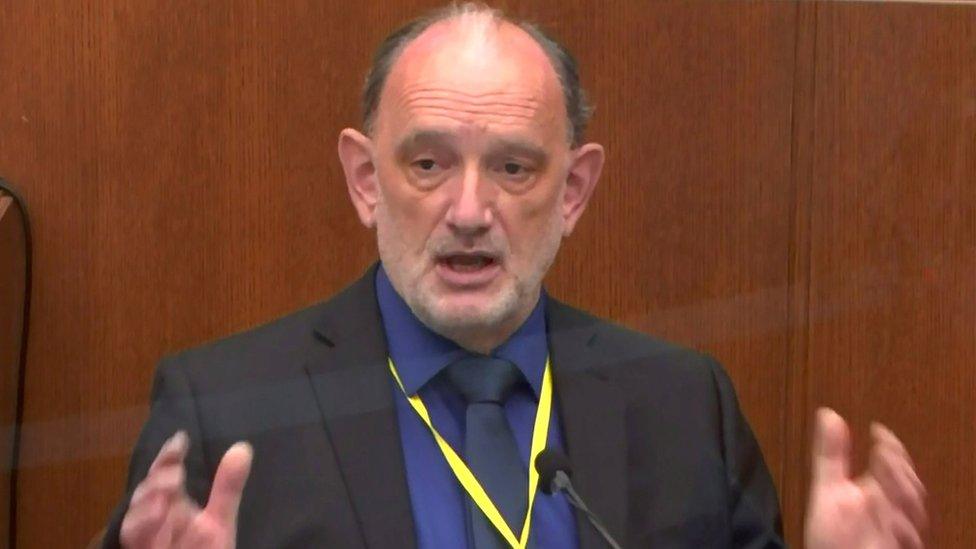
The forensic pathologist who was chief medical examiner for the state of Maryland until his retirement in 2019 said the cause of Mr Floyd's death was not clear.
He was questioned about the findings of the Hennepin County medical examiner, who ruled Mr Floyd's death a homicide.
"I would fall back to undetermined, in this particular case," Dr Fowler testified.
He said, in his opinion, the cause of death was not clear because there were "so many conflicting different potential mechanisms". These complicating factors, he said, could be considered homicide in some cases, and accidental in others.
Mr Floyd's consumption of fentanyl and methamphetamine, and his possible exposure to carbon monoxide poisoning from the police car's exhaust, were among the complicating factors cited by Dr Fowler.
Asked about the cause of death, Dr Fowler said he believed Mr Floyd suffered "a sudden cardiac arrest" while struggling with the officers.
Dr Fowler said Mr Floyd's health problems contributed to an erratic beating of his heart, known as sudden cardiac arrhythmia.
Peter Chang
'Very aggressive crowd'
The Minneapolis Park Police officer responded to the scene of Mr Floyd's arrest and said the crowd of bystanders was "very aggressive to the officers".
"Did that cause you any concern?" Defence lawyer Eric Nelson asked him.
"Concern for the officers' safety, yes," Mr Chang replied.
Related topics
- Published16 July 2020
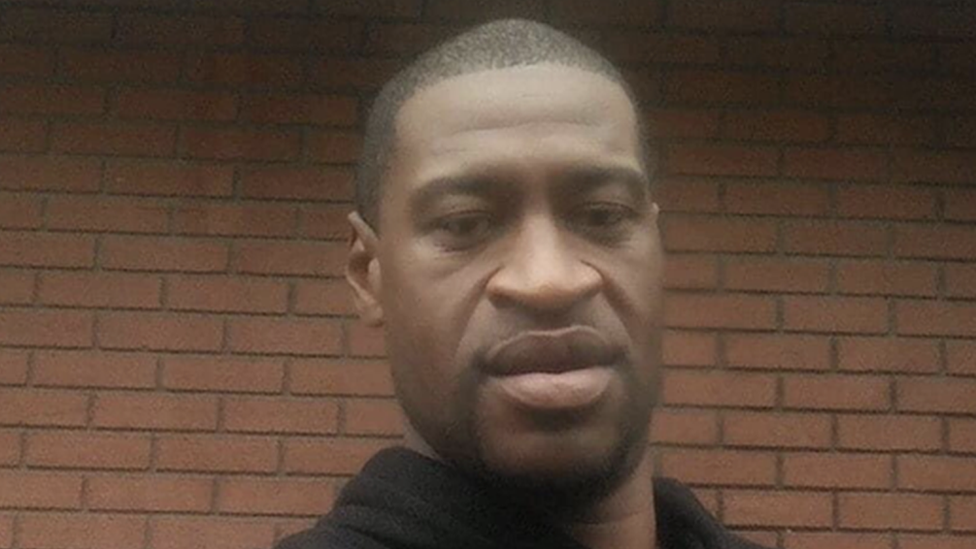
- Published10 March 2021
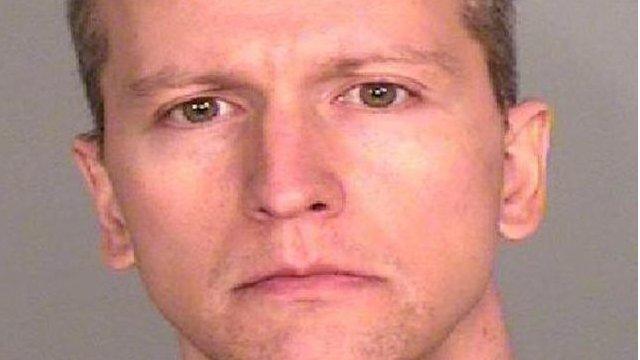
- Published24 March 2021
